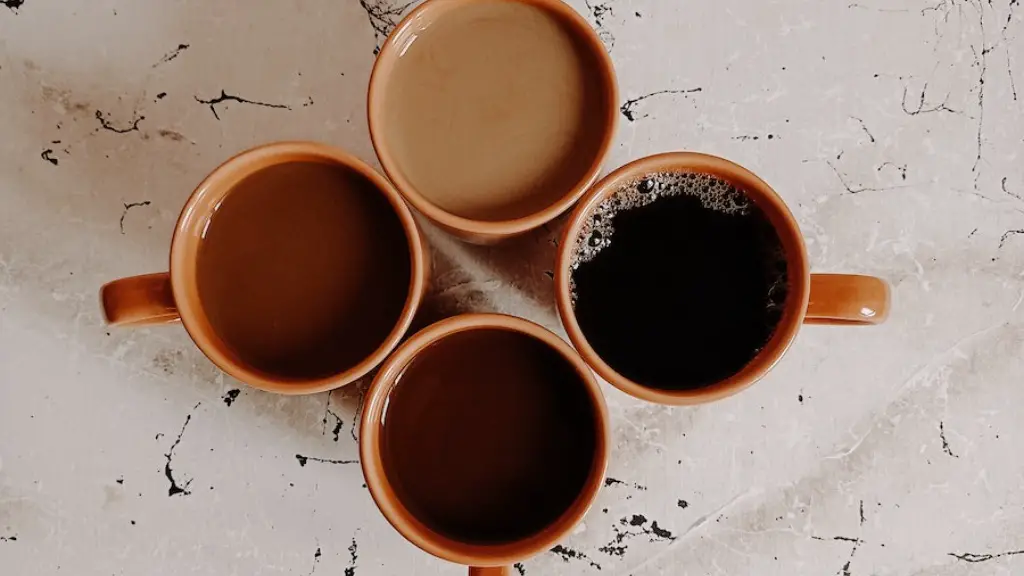Coffee has become an increasingly popular drink for many people. People consume it for its caffeine content and the energy boost it provides. But is there a certain time that is considered to be the latest time to drink coffee? This article will provide an answer to this question and provide more background information on the topic.
Coffee is a mild stimulant and is most effective when it is consumed in moderation. An 8-ounce cup of regular brewed coffee contains around 95 milligrams of caffeine, which can provide a boost of energy and increased productivity. However, drinking too much coffee can have adverse effects, leading to anxiety, nervousness and even sleeplessness. It is important to be aware of the quantity of coffee one consumes.
When it comes to drinking coffee, the timing is key in order to avoid negative effects. A general rule of thumb is that one should stop consuming caffeine at least six hours prior to going to bed. This will allow time for the caffeine to leave one’s system prior to going to sleep. The latest time one should drink coffee is usually around 4 pm.
It is important to be mindful of the amount of coffee one drinks. In general, it is recommended that one stick to a maximum of three cups per day – including any other caffeinated beverages. If one begins to experience anxiety, headaches, or irregular heart palpitations, it is a sign that one should reduce their caffeine intake and switch to decaffeinated coffee.
Studies have shown that caffeine is most effective when it is taken between 10 am and 12 pm. This is because the natural cycle of sleep and wakefulness follows a circadian rhythm and this is the time of day when alertness is naturally highest. After this time, it may be less effective as the body is winding down for sleep.
Consuming large amounts of caffeine late in the day can interfere with the natural cycle of sleep, causing one to stay up later than they would do so naturally. This can lead to poor quality sleep as one will still be feeling the effects of caffeine well into the evening. It can also interfere with the body’s internal clock, leading to insomnia and difficulty sleeping.
Experts recommend that people stick to coffee in the morning and late afternoon, rather than the evening. If one is particularly sensitive to caffeine, then it may be best to avoid it altogether. There are plenty of non-caffeinated options to choose from, such as tea and herbal drinks, which can still provide a natural energy boost.
Benefits of Drinking Coffee in the Morning
Drinking coffee in the morning can provide a host of benefits for those looking for a quick burst of energy. Caffeine has been found to enhance focus and alertness, whilst improving reaction times and problem-solving skills. This can be beneficial for those who have to concentrate for extended periods of time during the day. Studies have also shown that drinking coffee can have a positive effect on physical performance, improving endurance and strength during sporting activities.
In addition to providing an energy boost, coffee can also help to regulate mood and reduce fatigue. Studies have shown that drinking coffee can help to improve the mood of those who are feeling sluggish, depressed or anxious. It is also thought to reduce feelings of stress, anxiety and fatigue in those who are feeling overwhelmed by their workload.
In terms of health benefits, coffee can also help to reduce the risk of certain illnesses. Evidence suggests that coffee consumption can reduce the risk of stroke and some forms of cancer, as well as aiding in the prevention of other chronic diseases. It can also boost metabolism and help in weight loss, as it can increase thermogenic activity in the body.
Alternatives to Coffee
If one is looking for an alternative to coffee, there are plenty of options available. Green tea is a great option for those who are looking for a natural energy boost, as it contains lower amounts of caffeine than coffee, with approximately 20 milligrams in a cup. Other herbal drinks, such as rooibos and chamomile tea, are also a good choice if caffeine is not desired.
Caffeine-free energy drinks, such as Red Bull, contain a blend of caffeine-free ingredients that can be used for an energy boost. These energy drinks also contain taurine and B vitamins, which can help to nourish the nervous system and improve mental focus. For those who don’t enjoy the taste of coffee, energy drinks can be a good alternative.
Those looking for a more natural approach to energy can turn to physical activities such as yoga, running or HIIT, which can provide long-term benefits. Studies have found that regular exercise can help improve mental focus, boost mood and increase energy levels. This is a healthier alternative, as it helps to promote physical fitness whilst improving mental wellbeing.
Nutritional Benefits of Coffee
Coffee, alongside other caffeinated drinks, can offer some nutritional benefits, providing one consumes it in moderation. Coffee is rich in antioxidants, which can help to regulate cellular processes and protect against disease. This can reduce inflammation, as well as prevent the onset of conditions such as diabetes and heart disease.
Coffee can also provide vitamins and minerals which are important for bodily function. Coffee contains riboflavin (vitamin B2), pantothenic acid (vitamin B5), manganese and potassium. Whilst not everyone requires the same vitamins and minerals, consuming coffee can help to provide some of these vital micronutrients, which are important for general health and wellbeing.
Finally, drinking coffee can also improve digestion. Coffee stimulates the digestive system and helps to improve the absorption of essential micronutrients. It can also help to reduce the risk of digestive conditions such as irritable bowel syndrome and constipation.
Coffee and Body Weight
Coffee can also help to improve body weight, as it is believed to increase thermogenic activity in the body. This helps to increase energy expenditure and can aid with weight loss. Studies have also shown that caffeine can stimulate metabolic rate for up to three hours after it is consumed, leading to an overall improvement in body composition.
Whilst regularly drinking coffee can help with weight loss, it should be noted that it should not be relied upon as the sole weight-loss strategy. Caffeine should be consumed alongside a healthy and balanced diet, as well as regular exercise, in order to achieve successful weight-loss results.
It may also be helpful to switch to decaffeinated coffee if one is looking to lose weight. Decaffeinated coffee can provide the same benefits without the added stimulant, eliminating the risk of adverse side effects that come with consuming too much caffeine.
Consuming Coffee Late at Night
Consuming large amounts of coffee late in the evening can cause a number of negative effects. Caffeine can interrupt the natural rhythm of sleep and wakefulness, leading to difficulty sleeping and poor quality of rest. This can cause daytime fatigue and affect concentration levels, negatively impacting one’s performance. It is for this reason that one should avoid drinking coffee late in the evening, usually after 4 pm.
Large amounts of caffeine can also affect the body’s natural defense systems, leading to increased susceptibility to infections. This is because it can cause an increase in cortisol levels, which can impair the immune system. Increased cortisol levels can also cause an increase in blood pressure, leading to a variety of health problems.
Finally, drinking coffee late in the evening can also contribute to feelings of anxiety. Caffeine can increase feelings of stress and agitation, which can then lead to feelings of tension and worry. It can also cause irregular heart palpitations and rapid breathing, which can further exacerbate feelings of anxiety.
Advice from Professionals
When it comes to drinking coffee, it is best to follow the advice of professionals. Health experts advise that one should stick to a maximum of three cups of coffee per day and avoid drinking it close to bedtime. It is also important to switch to decaffeinated coffee if one is feeling overstimulated, as this can help to reduce the risk of negative side effects.
In terms of timing, it is recommended that one consumes coffee prior to midday in order to maximize its effects. This is because the body’s natural cycle of sleep and wakefulness follows a circadian rhythm and this is the time of day when alertness is naturally highest. After this time, it may be less effective as the body is winding down for sleep.
Finally, coffee should be consumed alongside a healthy diet and regular exercise. This will help to promote physical fitness whilst providing an energy boost. There are also plenty of alternatives to coffee, such as green tea, herbal drinks and energy drinks, which can be consumed for a natural energy boost.





